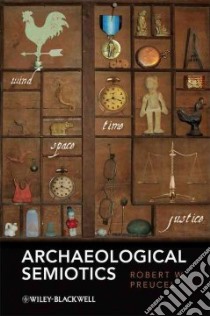Archaeological Semiotics - 9781405199131
Un libro in lingua di Preucel Robert W. edito da John Wiley & Sons Inc, 2010
- € 48.60
- Il prezzo è variabile in funzione del cambio della valuta d’origine
"Robert Preucel's book is a landmark study of a topic that is central to archaeological interpretation."-Matthew Johnson, University of Southampton
"Robert Preucel provides the kind of crisp clear introduction to a complex theoretical topic that is his trademark, and illustrates what that topic could mean in practice with case studies that draw on his own fieldwork." Rosemary Joyce, University of California, Berkeley
"Offering new insights into archaeological data, this important book also breaks down disciplinary barriers, to open up avenues of communication between archaeology and fields such as cognitive science, cultural anthropology, history, and linguistics."-Webb Kean, University of Michigan
"How meaning is generated in cultural life is a vast and central topic for the social sciences, including archaeology. This book is a must for anyone interested in this area."-Chris Gosden, University of Oxford
This interdisciplinary book examines archaeology's engagement with semiotics, from its early structuralist beginnings to its more recent Peircian encounters. It represents the first sustained engagement with Peircian semiotics in archaeology, as well as the first discussion of how pragmatic anthropology articulates with anthropological archaeology. Its central thesis is that archaeology is a distinctive kind of semiotic enterprise; one devoted to giving meaning to the past in the present through the study of materiality. It compliments standard studies of linguistics and reformulates contemporary theories of material culture.
Providing an introduction to Saussure and a review of his legacy across structural, symbolic, and cognitive anthropology, Preucel goes on to present the Peircian alternative and highlights its influence on pragmatic anthropology. Of special interest are the discussions of the interrelations of structuralism and processual archaeology, poststructuralism and postprocessual archaeologies, and cognitive science and cognitive archaeology. The author offers two original case studies demonstrating how material culture pragmatically mediates social relations - one focusing on the aftermath of the Pueblo Revolt from 1680-1694 and the other on the New England utopian community of Brook Farm from 1842-1846.
Throughout his analysis, Preucel emphasizes the close links between archaeology and other social sciences. But he also contends that archaeology, by virtue of the powerful ideological character of the past, can open up new spaces for discourse and dialogue about meaning, and, in the process, make a valuable contribution to contemporary semiotics.
Informazioni bibliografiche
- Titolo del Libro in lingua: Archaeological Semiotics
- Lingua: English
- Autore: Preucel Robert W.
- Editore: John Wiley & Sons Inc
- Collana: John Wiley & Sons Inc (Paperback)
- Data di Pubblicazione: 10 Maggio '10
- Genere: SOCIAL SCIENCE
- Pagine: 332
- Dimensioni mm: 228 x 152 x 19
- ISBN-10: 140519913X
- EAN-13: 9781405199131


